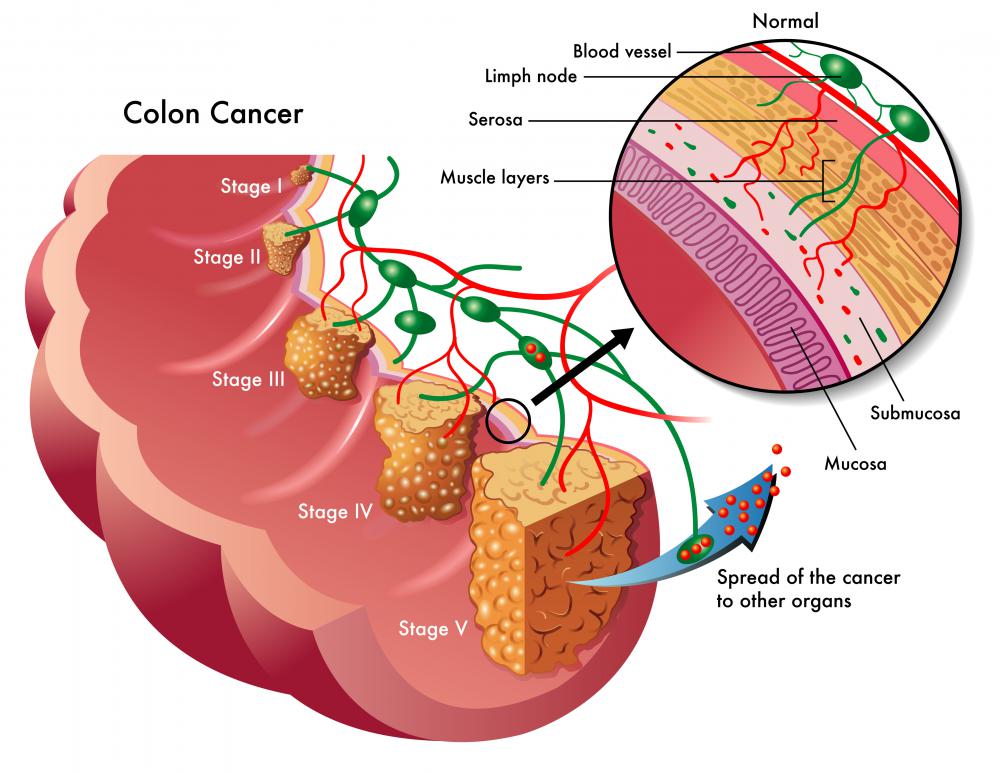At TheHealthBoard, we're committed to delivering accurate, trustworthy information. Our expert-authored content is rigorously fact-checked and sourced from credible authorities. Discover how we uphold the highest standards in providing you with reliable knowledge.
What are the Symptoms of Advanced Colon Cancer?
Advanced colon cancer is late stage 3 to stage 4 cancer of the colon or large intestine. When a person has late stage colon cancer, he or she will likely become very symptomatic. Some of the most common symptoms of advanced colon cancer include bloody stools, differences in usual bowel habits and chronic abdominal discomfort. Unintentional weight loss, changes in appetite and ongoing nausea can also be symptoms. Some individuals with colon cancer may also suffer from extreme fatigue.
Bloody stools can be a symptom of advanced colon cancer. The color of the blood may vary from being really bright to very dark red colored. In some individuals, the stools may appear so dark that they have a tarry appearance. Often in colon cancer, seeing spots of blood in stools can be an early symptom.

Changes in normal bowel habits can also be symptoms of this advanced disease. Bowel habit changes may include an unusual increase or decrease in bowel movements as well as abnormal bouts of diarrhea or constipation. There may also be the uneasy feeling that even after bathroom usage, the bowel is still somewhat full. Some individuals may also notice peculiar looking stools, such as a pencil thin appearance. Rectal bleeding may be an additional symptom with or without the occurrence of a bowel movement.

As colon cancer spreads, chronic abdominal pain and cramping can be other symptoms. The abdomen may appear especially bloated and often tender. In the late stages, some people may also endure pelvic pain. This may be a sign of the cancer advancing into organs in the lower abdomen such as the bladder.
Unintentional weight loss is another highly rated symptom of advanced colon cancer. This symptom can be attributed to several factors. For instance, many people with advanced cancer experience a loss of appetite. Other common symptoms such as nausea and vomiting can also cause unintentional loss of weight. Extreme fatigue and overall body weakness can also be symptoms of colon cancer as it progresses.

If an individual experiences symptoms of colon cancer, he or she should seek immediate help of a medical professional. The doctor will generally run several tests to conclude or exclude the presence of the disease. One test commonly used to diagnose colon cancer is a colonoscopy. The test is commonly recommended for older individuals and people of all ages with a family history of this type of cancer. Early diagnosis is key when treating cancer, so any symptoms similar to those of this disease should be investigated.
AS FEATURED ON:
AS FEATURED ON:















Discussion Comments
I have the gene for FAP, which basically means that I will probably develop colon cancer which could kill me, just like it has done for so many members of my family.
I got my MD way back in 1980, so I tried to convince most patients that colonoscopy is safe and effective. But, after getting my own exam without an anesthesiologist personally performing my sedation (instead of just a nurse -- yes, CRNAs are just nurses), I no longer recommend colonoscopy to any of my patients or to any of my friends. So-called "conscious sedation" is anything but. Many patients literally scream during the exam and the usual "cocktail" of sedation (fentanyl/midazolam) is a joke. The midazolam forces the patient to lie there in agony, unable to communicate how much pain they are actually in. Without an anesthesiologist personally performing the colonoscopy sedation, the procedure is a nightmare for many patients. Unless you can get an unsedated colonoscopy, make sure that an anesthesiologist (MD/DO) not a nurse/CRNA does your case.
Many patients consent to the barbaric "conscious sedation" which gets them out the door, but then they have hostile, combative frank PTSD symptoms a week or several weeks after colonoscopy "sedation." The patients call the endo center and ask, "Why can't I remember my kid's birthday a month after receiving Versed?"
I understand how those who have lost family members to colon cancer feel. We lost my brother to colon cancer when he was in his 50's.
As far as we knew, there was no previous family history so this really took everybody by surprise. We still don't know what the causes of his colon cancer were.
His cancer moved from his colon and ended up spreading through his entire body. At first the cancer was found in his colon, then it progressed to his lungs and spread from there.
By the time he was in the advanced stages it was hard to tell if his symptoms were from the cancer in the colon or from all throughout his body.
This is hard to watch a loved one go through. I would also encourage people who are in their 50's to get a colonoscopy if you have never had one.
You hear a lot of stories about them, but it really wasn't as horrible as I imagined it would be. It would be much less uncomfortable and inconvenient than struggling with the symptoms of advanced cancer.
@sunshined - That is encouraging to know that your dad had a positive outcome from his colon cancer treatment.
One of the best ways to avoid a colon cancer diagnosis is to have a colonoscopy done on a regular basis. This can go a long ways towards prevention and early treatment of this cancer.
Because colon cancer runs in my family, I had to have one done 10 years earlier than the average person does.
I watched my mom die of colon cancer so I get a regular colonoscopy for myself and my family. When her cancer progressed from stage 3 to stage 4 the symptoms were much harder to control.
She lost a lot of weight and had constant abdominal pain and discomfort. You learn to be thankful for each day you have with them. It got to the point where we just wanted her to be as comfortable as possible and free from pain.
The first symptom my dad had before he was diagnosed with colon cancer was blood in his stools. This can be quite alarming when you see this and he scheduled an appointment right away.
Many times when you can actually see this blood, the cancer is at stage 3 or 4. My dad was very fortunate he went to the doctor right away and got treatment.
He went through surgery and they told him he had metastatic colon cancer as it had spread to some of the surrounding lymph nodes.
I have always heard that if colon cancer is caught early enough, there is a lot they can do. Fortunately this was the case for my dad. He was 55 years old when they first found the colon cancer.
Today he is a healthy, active 83 year old man that stays busier than I do. He still has a colonoscopy done on a regular basis. There have been many times they have found polyps when this test is done, but they have all been benign.
It think it is encouraging to know that the colon cancer survival rate can be good if you catch it early enough.
@turkay1 - My mother-in-law had colon cancer and we eventually lost her to this awful disease. I know everybody reacts differently to the cancer and to the treatment, but I think many of the symptoms are the same whether you are male or female.
The first time this was found, she was diagnosed with stage 2 colon cancer. She went through months of chemotherapy and numerous doctor visits. Fortunately she didn't get too sick with the treatments. Her biggest complaint was fatigue and lack of energy.
She went for about 2 years before they determined the cancer had come back and this time she was at stage 4. At this point they gave her 6 months if she didn't have any more treatment.
She refused to go through any more chemotherapy only to have her life extended for a few months. I can't say that I blame her for this decision. It was right at 6 months when she passed away.
Towards the end she had lost a lot of weight and hardly looked like the same person.
@ddljohn-- I agree with you, the symptoms might be similar in some ways, but many colon cancer patients can have varying symptoms too. And let's not forget about chemotherapy and surgeries which come with their own list of side effects.
Colon cancer runs on my dad's side of the family. My uncle had it and so did my grandfather. I know from my uncle's experience that the chemotherapy was actually harder than the symptoms of the cancer. He had the bowel movement difficulties mostly under control with medications. But chemotherapy made him unbelievably tired. Of course, there is the psychological side effects and symptoms too because you lose your hair and all.
My dad and aunt spent a lot of time with my uncle during recovery time from surgeries too. He had new pain and bowel issues after surgery, so he needed care and help to do everyday things and care for himself.
I know about my dad's family's experience with advanced colon cancer but they're all men. Do women's symptoms differ from men's? Does anyone know what the symptoms of colon cancer in women are?
@ysmina-- I'm so happy to hear that your dad is all better, that's great!
My grandmother was not so lucky unfortunately. Since advanced colon cancer is the last two stages of it, the symptoms and risk of death increases in these stages. My grandmother had the same symptoms in the first two stages. Her main problem was constipation and blockage which I believe was the cause of the cancer.
She had a horrible time with bowel movements and made frequent visits to the hospital because of it, especially as she got older. As the cancer advanced to third stage however, it spread to other areas as well, ovules and lymph nodes.
Things became a lot worse for her after that. She refused chemotherapy and was in a lot of pain during stage 4 colon cancer. I'm sure she had other symptoms associated with the spreading cancer in other organs. I guess the symptoms depend on the specific case and how advanced the cancer is.
My dad's colon cancer was not diagnosed until he was in stage IV. He had all of the symptoms mentioned in the article. It started with abdominal pain, constipation and sometimes diarrhea. He was suspected of having irritable bowel syndrome or allergies to certain foods. But his symptoms didn't get better with diet.
It was only when he had bleeding and intense abdominal pain that he was sent for a colonoscopy. He was diagnosed with advanced colon cancer then. This was ten years ago. He underwent surgery and started getting chemotherapy right away.
I think we are really lucky because the treatment was able to reverse his cancer. He has been cancer-free for seven years. He doesn't have any of the symptoms anymore. No bleeding, pain, constipation or diarrhea. I don't know how high the risk of colon cancer recurrence is, but I hope he will remain cancer-free for the rest of his life.
Post your comments